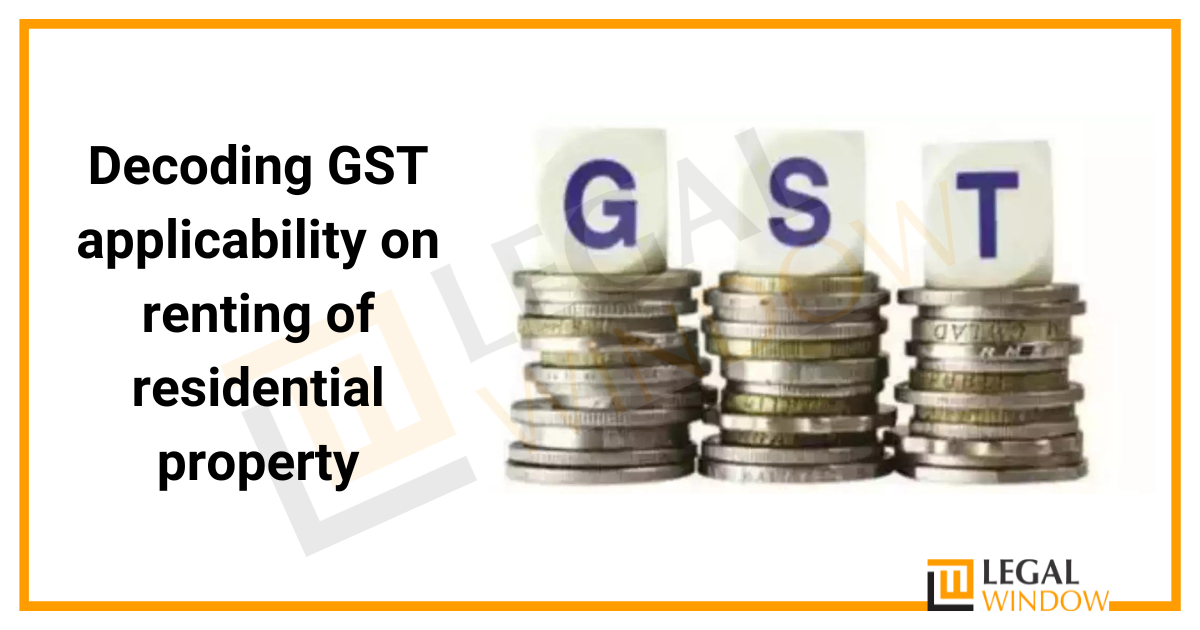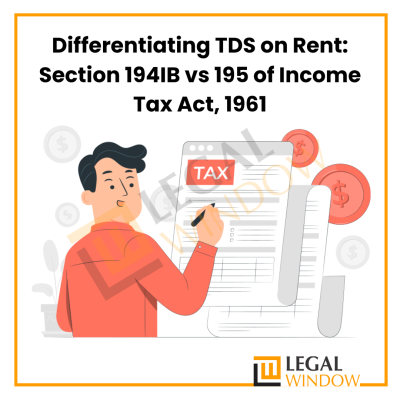
GST applicability means to whether or not a specific goods and service (G&S) is comes under the GST in India. It is a wider indirect tax, which can replace various previous existing indirect taxes. GST is levied on the supply of G&S and its applicability on all stages of the supply chain, from the manufacturing to consumption. One area is there has been some confusion that the GST applicability on renting of residential property. As per the Indian GST law, the renting of residential property comes under “supply of services”. That means it is subject to GST. While there are some exemptions that determine the GST applicability on renting of residential property. So, here in this article Legal window will decode the GST applicability on renting of residential property.
Brief discussion in relation to GST
The GST is a system of indirect tax that came into enforce on 1st of July, 2017. GST has replaced a complex web of indirect taxes that were levied by the central and state governments in India. Under GST, a single tax is levied on the supply of goods and services across the country. GST is divided into three categories – Central Goods and Services Tax (CGST), State Goods and Services Tax (SGST) and Integrated Goods and Services Tax (IGST). CGST is levied by the central government on intra-state transactions, while SGST is levied by the state governments on intra-state transactions. IGST is levied by the central government on inter-state transactions.
Glimpses of GST applicability on renting of residential property
It is important to understand that the GST law defines a “residential property” as any property that uses for residential purposes or intend to be used for residential purposes. It does not include any commercial property or property that is used for business purposes. The renting of a residential property is classified as a “supply of services” under the GST law. As per GST law, the renting of residential property is exempt from GST if the annual rent received from the property is less than Rs. 20 lakhs. This means that if the landlord is earning an annual rent of less than Rs. 20 lakhs from a residential property, they are not required to register for GST and are exempt from collecting and remitting GST on the rental income.
However, if the annual rent received from the residential property is equal to or more than Rs. 20 lakhs, the landlord is required to register for GST and collect and remit GST on the rental income. The GST rate applicable on renting of residential property is 18%. This means that the landlord requires to collect 18% GST on the rent charged from the tenant and remit it to the government. It is significant to note that even if the landlord is not required to register for GST due to the annual rent being less than Rs. 20 lakhs, they may still choose to register voluntarily. This can be beneficial if the landlord has multiple residential properties and the total annual rent received from all the properties is more than Rs. 20 lakhs. In such cases, the landlord can register for GST and claim input tax credit on the expenses related to maintaining the properties.
Significance of GST applicability on renting of residential property
The GST applicability on renting of residential property is significant for various reasons are as: –
- The GST applicability has increased transparency in the real estate sector. Landlords are now required to provide GST invoices to tenants, which makes it easier for tenants to claim input tax credit for the GST paid on the rent. This has also helped to reduce the occurrence of black money transactions in the rental market.
- It brings the rental market under the tax net, which was previously not taxed. This has increased government revenue and helped to create a level playing field for all players in the market.
- The GST applicability has helped to streamline the tax system in India. It has reduced the number of taxes that were previously applicable to the rental market, such as service tax and VAT. This has made the tax system simpler and more efficient.
- The GST applicability has brought more clarity to the real estate sector. Landlords and tenants now have a better understanding of their tax obligations, which has reduced the chances of disputes arising due to taxation issues.
- The GST applicability has helped to reduce the burden of double taxation. Under the previous tax regime, landlords were required to pay both service tax and VAT on the rent. With the implementation of GST, only one tax is applicable on the rent.
Impact of GST applicability on renting of residential property
The impact of GST applicability on renting of residential property has been significant since the implementation of the GST in India. Prior to GST, renting of residential properties was not subject to any service tax or VAT. However, under the GST regime, renting of residential properties is also considered as a service and is subject to GST. The GST on renting of residential properties is applicable only if the monthly rent exceeds Rs. 20,000. For rents below Rs. 20,000 per month, the landlord is not required to register for GST or collect GST from the tenant. However, for rents above Rs. 20,000 per month, the landlord requires to register for GST and collect GST at the rate of 18%.
The impact of GST applicability on renting of residential properties can be felt by both landlords and tenants. For landlords, the GST registration process and compliance requirements can be cumbersome and time-consuming. They must also collect and remit GST to the government on a regular basis, which can affect their cash flow. For tenants, the impact of GST on renting of residential properties can be felt in the form of higher rents. Landlords may increase the rent to account for the GST they require to collect and remit to the government. This can be a burden on tenants, especially in a market where rental rates are already high.
However, the GST applicability on renting of residential properties has also brought some benefits. It increases transparency in the real estate sector, as landlords are now require to provide GST invoices to tenants. This has made it easier for tenants to claim input tax credit for the GST paid on the rent. It has also helped to bring the rental market under the tax net and has increased government revenue. Overall, the impact of GST applicability on renting of residential properties has been mixed. While it has brought some benefits, it has also increased compliance requirements and rental costs for both landlords and tenants.
Exemptions of GST applicability on renting residential property
There are some exemptions under GST applicability on renting of residential property. These exemptions are as follows: –
- Renting of a residential property for residential uses is exempt from GST. However, this exemption is not applicable for commercial properties.
- Renting of property by a person who is not required to be registered under GST is also exempt. For example, if the landlord’s total turnover is less than Rs. 20 lakhs, he is not required to register under GST.
- Renting of vacant land or open plots is also exempt from GST.
- Educational institutions, hospitals, and charitable trusts that provide residential accommodation to their staff or students are also exempt from GST.
- Properties rented out for use as hotels, inns, guest houses, or other commercial establishments are not exempt from GST. These types of properties are considered commercial properties and are subject to GST.
- Hostels or boarding houses, where the rent is below Rs. 1,000 per day per room, are exempt from GST.
It is significant to note that while the renting of residential properties for residential purposes is exempt from GST, some services related to the rental may attract GST. For instance, if a landlord hires a property management company to manage the rental property. Then the services given by the property management company will attract GST. There are various exemptions under GST applicability on renting of residential property. That gives the relief to landlords and tenants. But it is significant to understand the nuances of these exemptions to make sure the compliance with GST regulations.
Takeaway
In conclusion, the GST applicability on renting of residential property is dependent on the annual rent received from the property. If the annual rent is less than Rs. 20 lakhs, the landlord is exempt from GST. However, if the annual rent is equal to or more than Rs. 20 lakhs, the landlord requires to register for GST and collect and remit GST on the rental income. Landlords may also choose to register for GST voluntarily if the total annual rent received from all properties is more than Rs. 20 lakhs. It is important to understand these GST regulations to ensure compliance and avoid penalties. The GST applicability on renting of residential properties is important as it brings transparency, efficiency, and simplicity to the tax system in the real estate sector. It also helps to increase government revenue and reduce the burden of double taxation on landlords.
CA Pulkit Goyal, is a fellow member of the Institute of Chartered Accountants of India (ICAI) having 10 years of experience in the profession of Chartered Accountancy and thorough understanding of the corporate as well as non-corporate entities taxation system. His core area of practice is foreign company taxation which has given him an edge in analytical thinking & executing assignments with a unique perspective. He has worked as a consultant with professionally managed corporates. He has experience of writing in different areas and keep at pace with the latest changes and analyze the different implications of various provisions of the act.
Categories
- Agreement Drafting (23)
- Annual Compliance (11)
- Change in Business (36)
- Company Law (148)
- Compliance (90)
- Digital Banking (3)
- Drug License (3)
- FEMA (17)
- Finance Company (42)
- Foreign Taxation (6)
- FSSAI License/Registration (14)
- GST (120)
- Hallmark Registration (1)
- Income Tax (202)
- Latest News (34)
- Miscellaneous (165)
- NBFC Registration (8)
- NGO (14)
- SEBI Registration (6)
- Section 8 Company (7)
- Start and manage a business (21)
- Startup/ Registration (130)
- Trademark Registration/IPR (40)
Recent Posts
About us
LegalWindow.in is a professional technology driven platform of multidisciplined experts like CA/CS/Lawyers spanning with an aim to provide concrete solution to individuals, start-ups and other business organisation by maximising their growth at an affordable cost.









